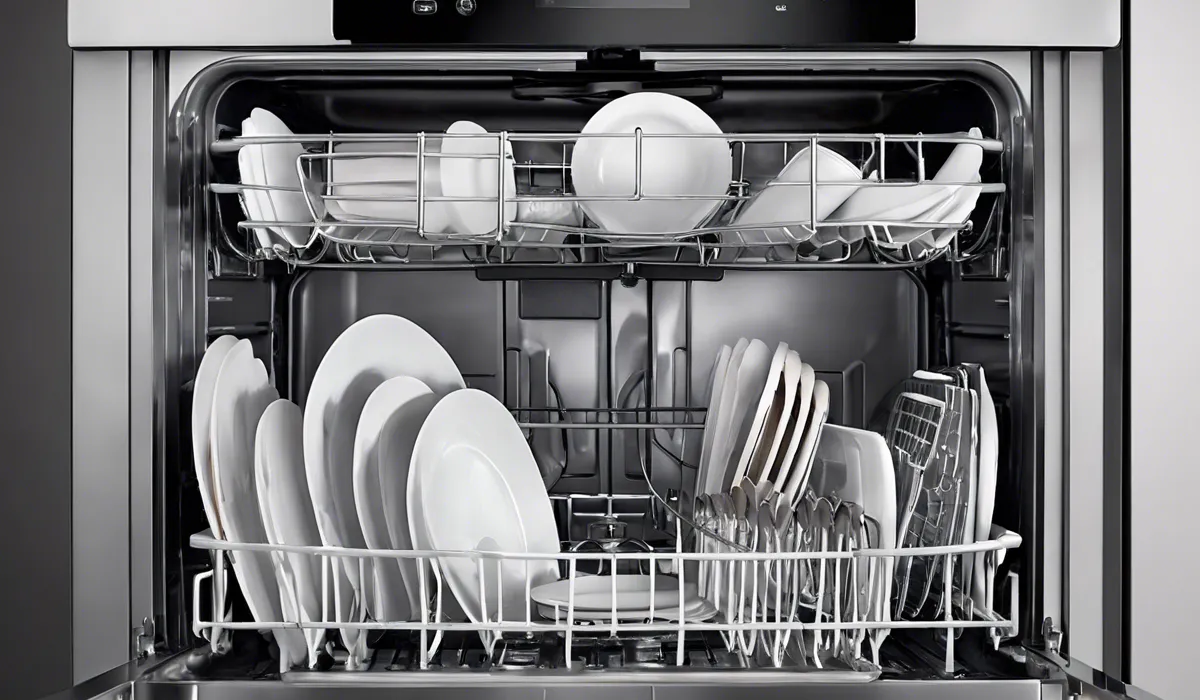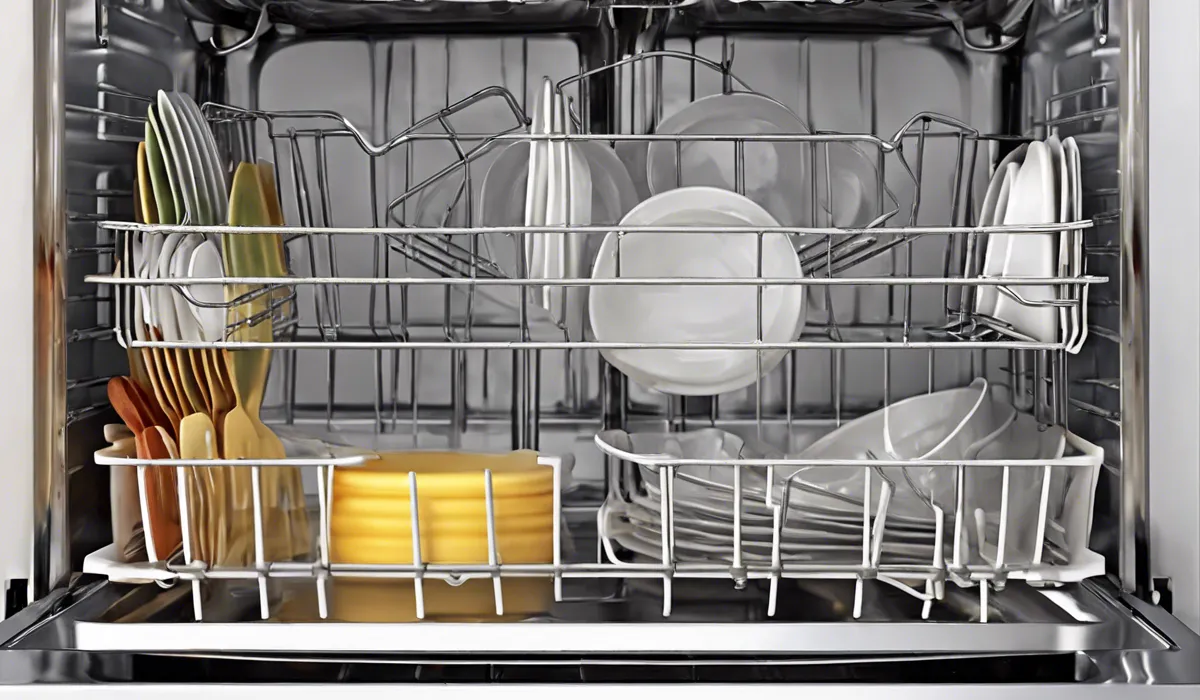What Not to Put in Dishwasher: 10 Surprising Items!
Avoid placing wood, cast iron, delicate crystal, insulated mugs, copper, nonstick pans, and sharp knives in the dishwasher. These items can be damaged by high heat and harsh detergents.
Common Items That Should Never Go in the Dishwasher

Wooden Utensils and Cutting Boards
Wooden kitchen tools are known for their beauty and durability. However, the dishwasher is not the place for them.
The combination of heat and moisture in a dishwasher can cause wooden utensils and cutting boards to warp, crack, or lose their finish.
The protective oils and sealants that keep these wooden items in top shape can deteriorate, leaving them dull and more susceptible to bacteria.
Nonstick Pots and Pans
Nonstick cookware has become a staple in modern kitchens, but the convenience stops at the dishwasher door.
The harsh environment inside a dishwasher can damage the nonstick coating, leading to its flaking and chipping over time.
Once damaged, these pots and pans may not perform as well, with food sticking and cooking unevenly. To preserve their functionality, it’s best to stick to hand washing.
Cast Iron Cookware
Cast iron is cherished for its heat retention and naturally nonstick surface that builds up over time.
This seasoning, however, is no friend to the dishwasher. Water and detergent will strip away the oils that form the seasoning, leading to rust and a degraded cooking surface.
Proper care for cast iron involves hand washing and re-oiling to maintain its seasoned glory.
Insulated Travel Mugs
Insulated travel mugs keep our drinks at the perfect temperature, but the dishwasher can compromise their insulation properties.
The seals that keep these mugs airtight and insulated can break down when exposed to dishwasher heat and pressure, resulting in a mug that can no longer maintain temperature as effectively.
Sharp Knives
Sharp knives are key tools in any kitchen, but the dishwasher is a danger zone for these precision instruments.
The abrasive detergents and jostling from water jets can dull the blades, while moisture can lead to rust spots. To keep your knives sharp and in prime condition, hand washing and immediate drying are the way to go.
Crystal Glassware
Crystal glassware, with its delicate beauty and intricate designs, demands careful handling.
The intense environment of a dishwasher can lead to chipping or cracking, robbing you of the sparkling clarity that makes crystal so special. To preserve these treasured pieces, it’s best to wash them gently by hand.
Certain Plastic Items
Not all plastics are created equal, and many can’t withstand the high heat of a dishwasher.
Items such as plastic storage containers might melt or warp, potentially releasing harmful chemicals and losing their shape, which can lead to a poor seal and spoilage of food.
Check the manufacturer’s label to determine if your plastic is dishwasher safe.
Pressure Cooker Lids
Pressure cookers are a marvel for quick cooking, but the lids are not meant for the dishwasher.
The safety valves and seals can become damaged, which can affect the pressure cooker’s performance and, more importantly, safety. Manual cleaning is necessary to keep these components in proper working order.
Copper Pans and Mugs
The rich luster of copper cookware and mugs is one of their main attractions, but a voyage through the dishwasher can leave them tarnished and dull.
The chemicals in dishwasher detergent can react with copper, leading to discoloration and loss of shine. To maintain their beauty, a gentle hand wash and regular polishing are recommended.
Aluminum Cookware and Utensils
Aluminum items are lightweight and conduct heat well, but they are also prone to discoloration and corrosion in the dishwasher.
The caustic detergents can cause pitting and a dull, grey finish on aluminum surfaces. To keep these items looking and performing their best, avoid the dishwasher and opt for hand washing.
Hand-Painted Ceramics or China
Hand-painted ceramics or fine china can be the showpieces of a dining table. These items, often cherished and sometimes irreplaceable, can suffer in the dishwasher.
The heat and water pressure can fade or wash away the delicate decorations. Preserve these beauties by hand washing them with care.
Reasons Why Some Items Can’t Go in the Dishwasher

Heat Damage
The high temperatures inside a dishwasher are great for cleaning but harmful for many materials. Wood can warp, plastics can melt, and certain metals can tarnish when exposed to the dishwasher’s heat.
This is especially true during the drying cycle, where high heat can cause even more damage.
Harsh Detergents
Dishwasher detergents are designed to be powerful cleaners, but their chemical composition can be too harsh for some surfaces.
Nonstick coatings can degrade, copper can tarnish, and hand-painted designs can fade. Always check if an item is dishwasher safe before exposing it to these strong cleaning agents.
Water Pressure and Jets
The vigorous water jets in a dishwasher are effective at removing food particles but can be too intense for delicate items.
Crystal glassware can chip, and sharp knives can become dull as they knock against other items. It’s best to carefully hand wash items that could be damaged by the force of the water.
Drying Cycle
The drying cycle poses another risk, particularly due to its intense heat. This can cause wood to crack and some plastics to warp or even melt.
By avoiding the dishwasher for certain items, you can prevent this type of heat damage and extend the life of your kitchenware.
Best Practices for Dishwasher Use and Alternatives for Non-Dishwasher Safe Items

Checking Labels and Manufacturer Instructions
Before loading anything into the dishwasher, it is crucial to check the labels and follow the manufacturer’s instructions.
These guidelines are there to ensure the longevity and proper care of your items, letting you know if it’s safe to use the dishwasher or if hand washing is necessary.
Hand Washing Tips for Delicate Items
When hand washing delicate items, use a soft sponge or cloth to avoid scratching surfaces.
Opt for mild detergents and warm water, and dry items immediately with a soft towel to prevent water spots, especially on materials like crystal and stainless steel.
Maintenance of Dishwasher-Safe Items
Even for dishwasher-safe items, placement matters. Ensure that plastic items are on the top rack away from the heating element, and space out items to avoid the potential of them knocking into each other during the wash cycle.
This careful placement can help prevent damage and extend the life of your kitchenware.
Alternatives to Using a Dishwasher
For items that cannot go in the dishwasher, consider eco-friendly washing methods. Using biodegradable soaps and reusable cloths can be good for your items and the environment.
Additionally, techniques such as soaking in baking soda can help remove stains without the need for a dishwasher.
FAQs About What Not to Put in Dishwasher
Can I put wood items in the dishwasher?
No, you should not put wood items in the dishwasher as they can be damaged by high heat and harsh detergents.
Is it safe to wash cast iron in the dishwasher?
No, cast iron should not be placed in the dishwasher as it can rust and lose its seasoning.
Can delicate crystal be cleaned in the dishwasher?
Delicate crystal should be washed by hand to avoid damage from high heat and harsh detergents found in dishwashers.
Should insulated mugs be put in the dishwasher?
Insulated mugs should not be placed in the dishwasher as they can be damaged and lose their insulation properties.
Can I wash nonstick pans in the dishwasher?
Nonstick pans should generally be hand-washed to avoid damaging the nonstick coating with high heat and harsh detergents.
Final Thoughts
It’s crucial to hand wash certain kitchen items to maintain their integrity. Wood, cast iron, delicate crystal, insulated mugs, copper, nonstick pans, and sharp knives should all be excluded from dishwasher cycles.
These materials can suffer from the appliance’s high temperatures and strong detergents, leading to damage and reduced lifespan.




